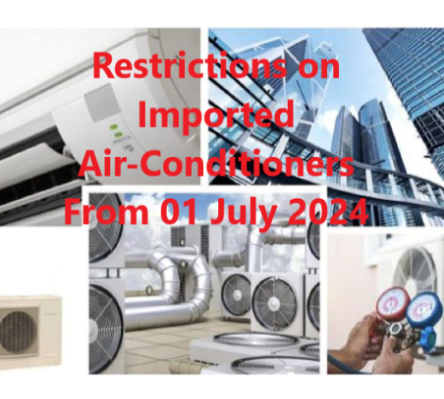From 01 July 2024, restrictions on the import and manufacture of certain small air conditioning equipment will come into force. The Australian Border Force (ABF) has issued Australian Customs Notice No. 2024/24: “Import prohibition on certain small air conditioning equipment.”
The Ozone Protection and Synthetic Greenhouse Gas Management Regulations 1995 have been amended to implement restrictions on the manufacture and import of certain small air conditioning equipment.
The amendments and explanatory statement can be found on the Federal Register of Legislation – Ozone Protection and Synthetic Greenhouse Gas Management Amendment (2024 Measures No. 1) Regulations 2024. The main regulations have not yet been updated to show the current version.
From 01 July 2024, restrictions on the import and manufacture of the following equipment will come into force:
- outdoor units for a single-head split air conditioning system
- portable air conditioner
- window/wall air conditioners (a single unit designed to be fixed to a window or wall).
Restrictions on the import and manufacture of outdoor units for a multi-head split air conditioning system will come into force from 01 July 2025.
The restrictions will apply to air conditioning equipment that:
- is designed to cool or heat, or both, a stationary space for human comfort
- has a standard refrigerant charge of 2.6 kilogram or less (per the compliance plate or manual)
- contains, or is designed to operate with, an HFC refrigerant that has a global warming potential (GWP) of more than 750.
The Department of Climate Change, Energy, the Environment and Water’s website provides lists of GWPs of the more commonly used refrigerants. Refrigerants commonly used for this type of equipment that will no longer be allowed to be imported include R-410A (GWP of 2,088) and R-134A (GWP of 1,430). Refrigerants used for this type of equipment that can continue to be imported include R-32 (GWP of 675) and R-290 (GWP less than 5).
The restrictions will not apply to:
- outdoor units for ducted systems
- equipment designed for use in mobile applications such as motor vehicles, caravans, aircraft and boats
- equipment designed for use in electrical enclosures and computer rooms
- air-to-water equipment, such as units for hydronic home heating systems.
An equipment licence may be granted under certain limited circumstances, enabling equipment to be imported under licence where:
- the equipment is essential for medical, veterinary, defence, industrial or public safety, or scientific purposes, and no practical and effective alternative exists
- the equipment is incidental to the main import, and it is impractical to remove or retrofit the equipment (for example, equipment incorporated into a large boat or drilling rig)
- exceptional circumstances exist.
Existing equipment in Australia will not be affected. Equipment imported or manufactured in Australia before 01 July 2024 may be sold after that date.
The import prohibition does not apply to equipment that is imported under the low volume exemption, the personal use exemption or the temporary import exemption.
See this related article from our archives: Import Controls on Electromagnetic Weapons
As licensed Customs Brokers and International Freight Forwarders, Colless Young gives you professional advice on all your consignments, both sea cargo and airfreight, as well as the allied services of trucking and warehousing. We provide a complete range of import and export services, covering customs clearance and quarantine treatments. We are based in Brisbane and offer logistics facilities through all Australian ports and airports.

